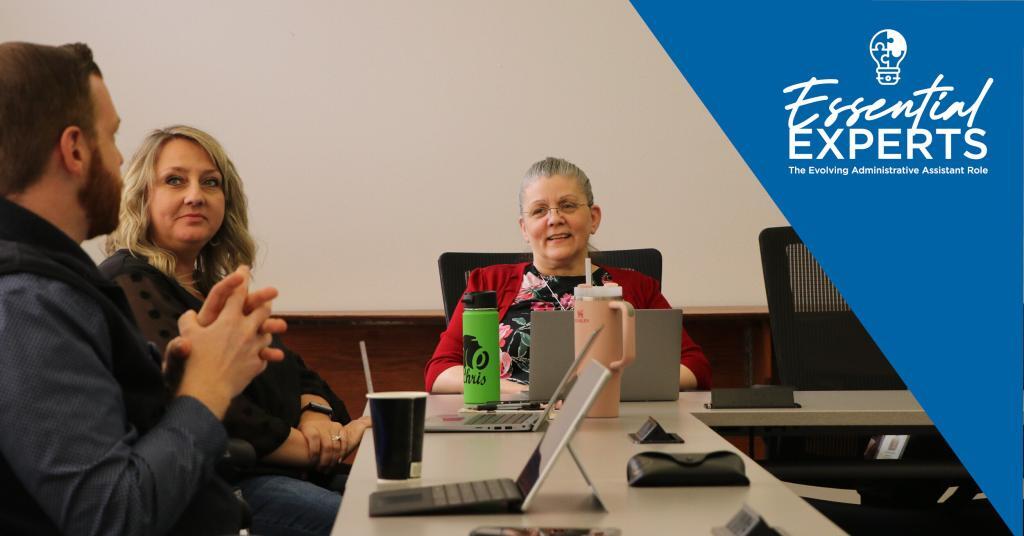
The April meeting of Valley Coast Superintendents Association executive assistants gave Eddie Symington, assistant to the Lincoln County School District superintendent and board, (left) a chance to ask questions of people with similar positions. Chris Green, Greater Albany Public Schools assistant to the superintendent and board, (right) and Lisa Schoen, the Linn Benton Lincoln Education Service District executive assistant, (center) spearheaded creation of a networking group. (Photo by Jake Arnold, OSBA)
The April 9 Lincoln County School Board meeting prompted a procedural question about publishing district information in the local paper of record.
Eddie Symington, the board secretary, didn’t know the answer, but he knew where to turn.
He raised the question the next day at the monthly meeting of the Valley Coast Superintendents Association executive assistants group. A lively discussion ensued with suggestions of where to find a definitive solution.
“We keep each other on the up and up,” Symington said.
This work group has become a valued source of professional development as well as personal support for its members, said Jenn Nelson, OSBA Board Development senior administrative assistant. Nelson said such networking learning communities are invaluable for administrative professionals.
The assistant position for superintendents and school boards carries a wide range of often complex duties that are essential to a district’s running smoothly, but preparation for the role is often minimal. An occasional OREdNews series, “Essential Experts,” examines how some administrative professionals are tackling the evolving role and challenges of supporting school board leadership.
Nelson has been working through OSBA to raise administrative professionals’ profile and give them more opportunities to increase their skills. She asked the Valley Coast group to present a session on networking to administrative professionals the day before the 2023 OSBA Annual Convention.
The workgroup grew out of Chris Green’s own desire for more support when she became the Greater Albany Public Schools executive assistant in 2018.
Green had already been working in schools for more than 15 years, but the executive assistant and board secretary roles include responsibilities that aren’t held in any other school positions. She turned to administrative professionals in other districts for advice.
The pandemic delayed the group’s formation until 2022. The group brings together board secretaries and executive assistants from the Linn Benton Lincoln Education Service District area, and the ESD provides support. Lisa Schoen, the ESD executive assistant, provides much of the organization and coordination as well as being an enthusiastic group member.
The group meets monthly in person at rotating districts and is planning its second annual retreat.
The group’s agenda-packed afternoons cover important job knowledge as well as how different districts handle similar requirements. Recent topics have ranged from parliamentary procedure to time-saving Google Docs tips and tricks.
The group is also working on an assistant handbook that could be individualized for each district, an answer to one of the job’s biggest challenges.
“Nobody gets a manual when they get this job,” said Nelson, who has also been a district administrative professional. OSBA offers board secretary training opportunities at its conferences, but administrative professionals often fill several other roles.
Such groups are great for asking questions, particularly when faced with new or difficult situations, Nelson said, but she cautioned that administrative professionals should always seek advice from OSBA or regulatory agencies when problem-solving legal issues.
The handbook will have sections on such things as needs in the first month, a calendar of important school and board dates, and how-to instructions for specific tasks.
Symington is in his third year as assistant to the superintendent and board secretary after working as a clerk in a different field. He said people often come to the job with office skills but executive assistant and board secretary require some specialized knowledge.
“This group has been my greatest source of professional development,” he said. “Superintendents don’t even fully understand what we do.”
Jason Hay, the Linn Benton Lincoln ESD superintendent, said he has seen the benefits, though. He said the group has created positive connections between the districts and shared methods for tackling similar challenges. He said the assistants have a perspective that superintendents don’t have and that can generate ideas “in an organic way.”
The group requires some time away from duties but the district more than gets that back with the learning taking place, Hay said.
Andy Gardner, the Greater Albany superintendent, strongly agrees.
“It’s well worth the time,” he said. “I love that the people in that group get a chance to lead their practice and be really thoughtful about their practice.”
Nelson said supporting such groups with paid time or meeting space is “a bargain” because it offers training without paying to bring people in. It also ensures the learning can be tightly focused on local conditions and needs.
Equally important to the group is the fellowship it provides. Their monthly meetings are often followed by a shared meal, and friendships outside work have developed.
Symington said the job can be isolating because assistants are often privy to confidential information. At the same time, administrative professionals who serve as both board secretary and executive assistant occupy an awkward position in the hierarchy.
“We work for the boss of the district, and we also work for the boss of the boss,” he said.
He said the group allows him to ask questions he couldn’t ask anyone else.
Nelson has been working to foster similar networking at a state level, setting up monthly meetings and online chats.
“When you get together with people who do what you do, creativity flows,” she said.
– Jake Arnold, OSBA
[email protected]
Past stories:
Learning the road to clear the way
Title change helps perception catch up to reality of administrative professional work